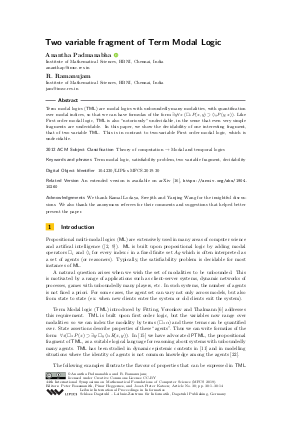Two variable fragment of Term Modal Logic
Authors
Anantha Padmanabha  ,
R. Ramanujam
,
R. Ramanujam
-
Part of:
Volume:
44th International Symposium on Mathematical Foundations of Computer Science (MFCS 2019)
Part of: Series: Leibniz International Proceedings in Informatics (LIPIcs)
Part of: Conference: Mathematical Foundations of Computer Science (MFCS) - License:
 Creative Commons Attribution 3.0 Unported license
Creative Commons Attribution 3.0 Unported license
- Publication Date: 2019-08-20
File

PDF
LIPIcs.MFCS.2019.30.pdf
- Filesize: 1.44 MB
- 14 pages
Document Identifiers
Related Versions
-
An extended version is available on arXiv [Padmanabha and Ramanujam, 2019], https://arxiv.org/abs/1904.10260
Subject Classification
ACM Subject Classification
- Theory of computation → Modal and temporal logics
Keywords
- Term modal logic
- satisfiability problem
- two variable fragment
- decidability
Metrics
- Access Statistics
-
Total Accesses (updated on a weekly basis)
0Document
0Metadata
Abstract
Term modal logics (TML) are modal logics with unboundedly many modalities, with quantification over modal indices, so that we can have formulas of the form Exists y Forall x (Box_x P(x,y) implies Diamond_y P(y,x)). Like First order modal logic, TML is also "notoriously" undecidable, in the sense that even very simple fragments are undecidable. In this paper, we show the decidability of one interesting fragment, that of two variable TML. This is in contrast to two-variable First order modal logic, which is undecidable.
Cite As Get BibTex
Anantha Padmanabha and R. Ramanujam. Two variable fragment of Term Modal Logic. In 44th International Symposium on Mathematical Foundations of Computer Science (MFCS 2019). Leibniz International Proceedings in Informatics (LIPIcs), Volume 138, pp. 30:1-30:14, Schloss Dagstuhl – Leibniz-Zentrum für Informatik (2019)
https://doi.org/10.4230/LIPIcs.MFCS.2019.30
BibTex
@InProceedings{padmanabha_et_al:LIPIcs.MFCS.2019.30,
author = {Padmanabha, Anantha and Ramanujam, R.},
title = {{Two variable fragment of Term Modal Logic}},
booktitle = {44th International Symposium on Mathematical Foundations of Computer Science (MFCS 2019)},
pages = {30:1--30:14},
series = {Leibniz International Proceedings in Informatics (LIPIcs)},
ISBN = {978-3-95977-117-7},
ISSN = {1868-8969},
year = {2019},
volume = {138},
editor = {Rossmanith, Peter and Heggernes, Pinar and Katoen, Joost-Pieter},
publisher = {Schloss Dagstuhl -- Leibniz-Zentrum f{\"u}r Informatik},
address = {Dagstuhl, Germany},
URL = {https://drops.dagstuhl.de/entities/document/10.4230/LIPIcs.MFCS.2019.30},
URN = {urn:nbn:de:0030-drops-109741},
doi = {10.4230/LIPIcs.MFCS.2019.30},
annote = {Keywords: Term modal logic, satisfiability problem, two variable fragment, decidability}
}
Author Details
Acknowledgements
We thank Kamal Lodaya, Sreejith and Yanjing Wang for the insightful discussions. We also thank the anonymous referees for their comments and suggestions that helped better present the paper.
References
-
Hajnal Andréka, István Németi, and Johan van Benthem. Modal languages and bounded fragments of predicate logic. Journal of philosophical logic, 27(3):217-274, 1998.

-
Patrick Blackburn, Maarten de Rijke, and Yde Venema. Modal Logic (Cambridge Tracts in Theoretical Computer Science). Cambridge University Press, 2001.

-
Giovanna Corsi. A unified completeness theorem for quantified modal logics. The Journal of Symbolic Logic, 67(4):1483-1510, 2002.

-
Kit Fine et al. Normal forms in modal logic. Notre Dame journal of formal logic, 16(2):229-237, 1975.

-
Melvin Fitting and Richard L. Mendelsohn. First-Order Modal Logic (Synthese Library). Springer, 1999.

- Melvin Fitting, Lars Thalmann, and Andrei Voronkov. Term-Modal Logics. Studia Logica, 69(1):133-169, 2001. URL: https://doi.org/10.1023/A:1013842612702.
-
Erich Grädel, Phokion G Kolaitis, and Moshe Y Vardi. On the decision problem for two-variable first-order logic. Bulletin of symbolic logic, 3(1):53-69, 1997.

-
Erich Grädel and Martin Otto. On logics with two variables. Theoretical computer science, 224(1-2):73-113, 1999.

-
MJ Hughes and GE Cresswell. A New Introduction to Modal Logic. Routledge. 1996. Routledge, 1996.

-
Roman Kontchakov, Agi Kurucz, and Michael Zakharyaschev. Undecidability of first-order intuitionistic and modal logics with two variables. Bulletin of Symbolic Logic, 11(3):428-438, 2005.

-
Barteld Kooi. Dynamic term-modal logic. In A Meeting of the Minds, pages 173-186, 2007.

- Saul A. Kripke. The Undecidability of Monadic Modal Quantification Theory. Mathematical Logic Quarterly, 8(2):113-116, 1962. URL: https://doi.org/10.1002/malq.19620080204.
-
Michael Mortimer. On languages with two variables. Mathematical Logic Quarterly, 21(1):135-140, 1975.

-
Eugenio Orlandelli and Giovanna Corsi. Decidable Term-Modal Logics. In 15th European Conference on Multi-Agent Systems, 2017.

-
Anantha Padmanabha and R Ramanujam. The Monodic Fragment of Propositional Term Modal Logic. Studia Logica, pages 1-25, 2018.

- Anantha Padmanabha and R Ramanujam. Two variable fragment of Term Modal Logic. arXiv preprint, 2019. URL: http://arxiv.org/abs/1904.10260.
- Anantha Padmanabha, R Ramanujam, and Yanjing Wang. Bundled Fragments of First-Order Modal Logic: (Un)Decidability. In Sumit Ganguly and Paritosh Pandya, editors, 38th IARCS Annual Conference on Foundations of Software Technology and Theoretical Computer Science (FSTTCS 2018), volume 122 of Leibniz International Proceedings in Informatics (LIPIcs), pages 43:1-43:20. Schloss Dagstuhl-Leibniz-Zentrum fuer Informatik, 2018. URL: https://doi.org/10.4230/LIPIcs.FSTTCS.2018.43.
-
Mikhail Rybakov and Dmitry Shkatov. Undecidability of first-order modal and intuitionistic logics with two variables and one monadic predicate letter. Studia Logica, pages 1-23, 2017.

-
Gennady Shtakser. Propositional Epistemic Logics with Quantification Over Agents of Knowledge. Studia Logica, 106(2):311-344, 2018.

- Gennady Shtakser. Propositional Epistemic Logics with Quantification Over Agents of Knowledge (An Alternative Approach). Studia Logica, August 2018. URL: https://doi.org/10.1007/s11225-018-9824-6.
- Yanjing Wang. A New Modal Framework for Epistemic Logic. In Proceedings Sixteenth Conference on Theoretical Aspects of Rationality and Knowledge, TARK 2017, Liverpool, UK, 24-26 July 2017., pages 515-534, 2017. URL: https://doi.org/10.4204/EPTCS.251.38.
-
Yanjing Wang and Jeremy Seligman. When Names Are Not Commonly Known: Epistemic Logic with Assignments. In Advances in Modal Logic Vol. 12 (2018): 611-628, College Publications, 2018 .

-
Frank Wolter and Michael Zakharyaschev. Decidable fragments of first-order modal logics. The Journal of Symbolic Logic, 66(3):1415-1438, 2001.

